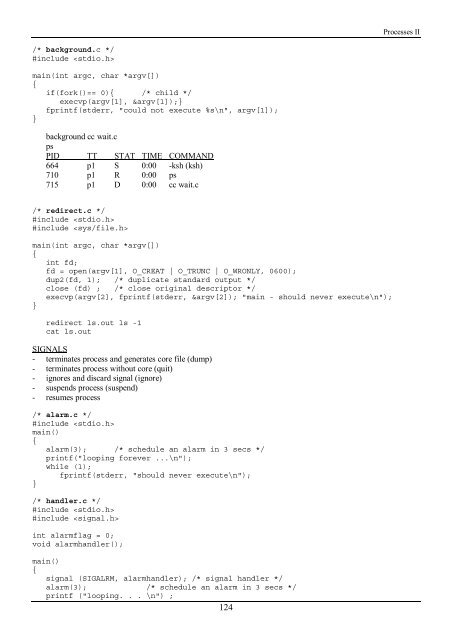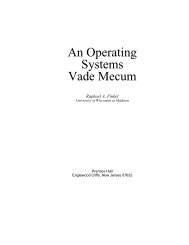Create successful ePaper yourself
Turn your PDF publications into a flip-book with our unique Google optimized e-Paper software.
Processes II<br />
/* background.c */<br />
#include <br />
main(int argc, char *argv[])<br />
{<br />
if(fork()== 0){ /* child */<br />
execvp(argv[1], &argv[1]);}<br />
fprintf(stderr, "could not execute %s\n", argv[1]);<br />
}<br />
background cc wait.c<br />
ps<br />
PID TT STAT TIME COMMAND<br />
664 p1 S 0:00 -ksh (ksh)<br />
710 p1 R 0:00 ps<br />
715 p1 D 0:00 cc wait.c<br />
/* redirect.c */<br />
#include <br />
#include <br />
main(int argc, char *argv[])<br />
{<br />
int fd;<br />
fd = open(argv[1], O_CREAT | O_TRUNC | O_WRONLY, 0600);<br />
dup2(fd, 1); /* duplicate standard output */<br />
close (fd) ; /* close original descriptor */<br />
execvp(argv[2], fprintf(stderr, &argv[2]); "main - should never execute\n");<br />
}<br />
redirect ls.out ls -1<br />
cat ls.out<br />
SIGNALS<br />
- terminates process and generates core file (dump)<br />
- terminates process <strong>with</strong>out core (quit)<br />
- ignores and discard signal (ignore)<br />
- suspends process (suspend)<br />
- resumes process<br />
/* alarm.c */<br />
#include <br />
main()<br />
{<br />
alarm(3); /* schedule an alarm in 3 secs */<br />
printf("looping forever ...\n");<br />
while (1);<br />
fprintf(stderr, "should never execute\n");<br />
}<br />
/* handler.c */<br />
#include <br />
#include <br />
int alarmflag = 0;<br />
void alarmhandler();<br />
main()<br />
{<br />
signal (SIGALRM, alarmhandler); /* signal handler */<br />
alarm(3); /* schedule an alarm in 3 secs */<br />
printf ("looping. . . \n") ;<br />
124
















